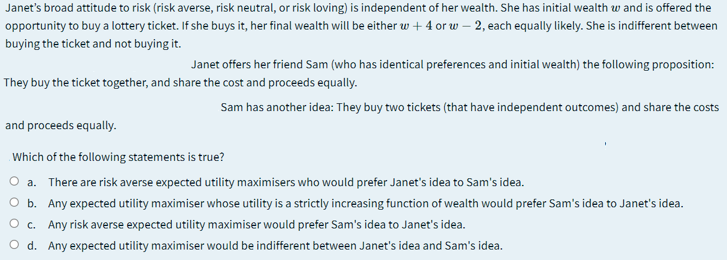Janet's broad attitude to risk (risk averse, risk neutral, or risk loving) is independent of her wealth. She has initial wealth w and is offered the opportunity to buy a lottery ticket. If she buys it, her final wealth will be either w + 4 or w – 2, each equally likely. She is indifferent between buying the ticket and not buying it. Janet offers her friend Sam (who has identical preferences and initial wealth) the following proposition: They buy the ticket together, and share the cost and proceeds equally. Sam has another idea: They buy two tickets (that have independent outcomes) and share the costs and proceeds equally. Which of the following statements is true? O a. There are risk averse expected utility maximisers who would prefer Janet's idea to Sam's idea. O b. Any expected utility maximiser whose utility is a strictly increasing function of wealth would prefer Sam's idea to Janet's idea. O c. Any risk averse expected utility maximiser would prefer Sam's idea to Janet's idea. O d. Any expected utility maximiser would be indifferent between Janet's idea and Sam's idea.
Janet's broad attitude to risk (risk averse, risk neutral, or risk loving) is independent of her wealth. She has initial wealth w and is offered the opportunity to buy a lottery ticket. If she buys it, her final wealth will be either w + 4 or w – 2, each equally likely. She is indifferent between buying the ticket and not buying it. Janet offers her friend Sam (who has identical preferences and initial wealth) the following proposition: They buy the ticket together, and share the cost and proceeds equally. Sam has another idea: They buy two tickets (that have independent outcomes) and share the costs and proceeds equally. Which of the following statements is true? O a. There are risk averse expected utility maximisers who would prefer Janet's idea to Sam's idea. O b. Any expected utility maximiser whose utility is a strictly increasing function of wealth would prefer Sam's idea to Janet's idea. O c. Any risk averse expected utility maximiser would prefer Sam's idea to Janet's idea. O d. Any expected utility maximiser would be indifferent between Janet's idea and Sam's idea.
Brief Principles of Macroeconomics (MindTap Course List)
8th Edition
ISBN:9781337091985
Author:N. Gregory Mankiw
Publisher:N. Gregory Mankiw
Chapter9: The Basic Tools Of Finance
Section: Chapter Questions
Problem 9PA
Related questions
Question

Transcribed Image Text:Janet's broad attitude to risk (risk averse, risk neutral, or risk loving) is independent of her wealth. She has initial wealth w and is offered the
opportunity to buy a lottery ticket. If she buys it, her final wealth will be either w + 4 or w – 2, each equally likely. She is indifferent between
buying the ticket and not buying it.
Janet offers her friend Sam (who has identical preferences and initial wealth) the following proposition:
They buy the ticket together, and share the cost and proceeds equally.
Sam has another idea: They buy two tickets (that have independent outcomes) and share the costs
and proceeds equally.
Which of the following statements is true?
O a. There are risk averse expected utility maximisers who would prefer Janet's idea to Sam's idea.
O b. Any expected utility maximiser whose utility is a strictly increasing function of wealth would prefer Sam's idea to Janet's idea.
O c. Any risk averse expected utility maximiser would prefer Sam's idea to Janet's idea.
O d. Any expected utility maximiser would be indifferent between Janet's idea and Sam's idea.
Expert Solution
This question has been solved!
Explore an expertly crafted, step-by-step solution for a thorough understanding of key concepts.
This is a popular solution!
Trending now
This is a popular solution!
Step by step
Solved in 2 steps

Knowledge Booster
Learn more about
Need a deep-dive on the concept behind this application? Look no further. Learn more about this topic, economics and related others by exploring similar questions and additional content below.Recommended textbooks for you

Brief Principles of Macroeconomics (MindTap Cours…
Economics
ISBN:
9781337091985
Author:
N. Gregory Mankiw
Publisher:
Cengage Learning

Essentials of Economics (MindTap Course List)
Economics
ISBN:
9781337091992
Author:
N. Gregory Mankiw
Publisher:
Cengage Learning


Brief Principles of Macroeconomics (MindTap Cours…
Economics
ISBN:
9781337091985
Author:
N. Gregory Mankiw
Publisher:
Cengage Learning

Essentials of Economics (MindTap Course List)
Economics
ISBN:
9781337091992
Author:
N. Gregory Mankiw
Publisher:
Cengage Learning
